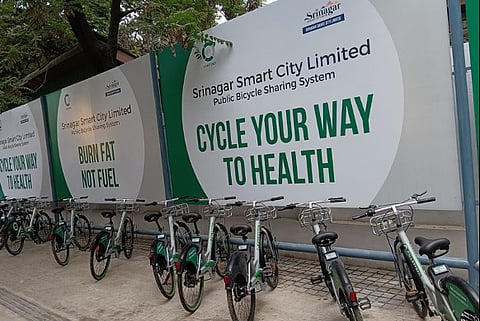Srinagar Smart City Project: High On Technology, Low on Urban Planning
Srinagar, a city characterised by fertile land set against a beautiful mountain backdrop, is overtaken by unappealing construction, tangled phone lines, and poorly built and garbage littered on roads. The city’s population has increased rapidly with an annual average increase by 2.3 percent and stands at 1.77 million.
Srinagar Smart City Project is advertised across the city as promoting development. But the focus is on bringing new technologies to make the city ‘smart’, and urban planning remains poor. Shop-owners freely encroach on roads and build shops without any regard for either visual appeal or the safety and convenience of pedestrians. Cars then park outside these shops as there is no planned parking in the city. This causes congestion on already narrow streets.
Much worse, no urban planning measures have been taken to dictate standards for construction. Unplanned construction and illegal encroachment is obstructing the once idyllic scenic views of Srinagar.
Architecture and nature have historically been deeply important to Srinagar’s population, but this lack of care in planning the city accordingly is slowly changing the way people care for the city. Littering on the sidewalk and blocking the roads has become commonplace, and this culture must be reversed.
This is worsened by the complete lack of green spaces to break up construction and preserve nature in the fertile city. The World Health Organization recommends 9 m² of green space per person, but Srinagar has less than 3 m² per person. This is simply inadequate for Srinagar, where a plethora of natural flora thrives in the fertile soil.
Much of the urban planning is focused on layout of roads. Several flyovers have been constructed to accommodate the growing number of vehicles. However, vehicle registrations doubled from 200,000 in 2011 to 400,000 in 2021, and expansion attempts have been simply insufficient. The investment and planning required is more than a handful of flyovers and roads. The current level of congestion necessitates multi-dimensional and long-term planning and ambitious infrastructure initiatives.
Crucially, these changes must be informed by Srinagar’s natural beauty and its architectural and artistic heritage .
Urban planning must aim to target key needs of the population. For example, public waste bins are non-existent in Srinagar. Waste can therefore be seen strewn along streets. Astonishingly, there is an open municipal waste collection centre near the heart of Srinagar in Polo View, right on the prestigious Maulana Azad Road. Such evident disregard for sanitation and aesthetics creates an environment where residents do not feel any sense of civic duty.
Another basic need is pavements, providing safe routes for pedestrians. Right now, less than 15% of Srinagar’s roads have pedestrian pavements, despite the culture of walking to school and stores in the city.
For Srinagar to become a Smart City, it first needs a foundation of urban planning that serves the long-term interests of the city.
This means prioritising the preservation of greenery and natural beauty, expanding roads instead of allowing encroachment, and improving the core systems that run the city such as sanitation and waste management. Without these fundamentals, urban development will never lead to meaningful progress in the lives of its residents.
(Sufi Ali is a student contributor, interested in human rights and public policy in the Kashmir Valley and can be reached at: sufi786ali@gmail.com)
Have you liked the news article?

